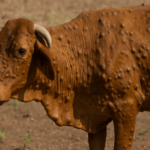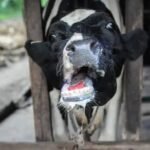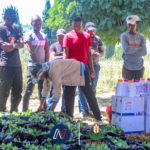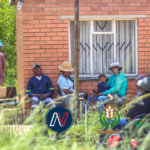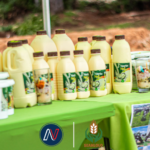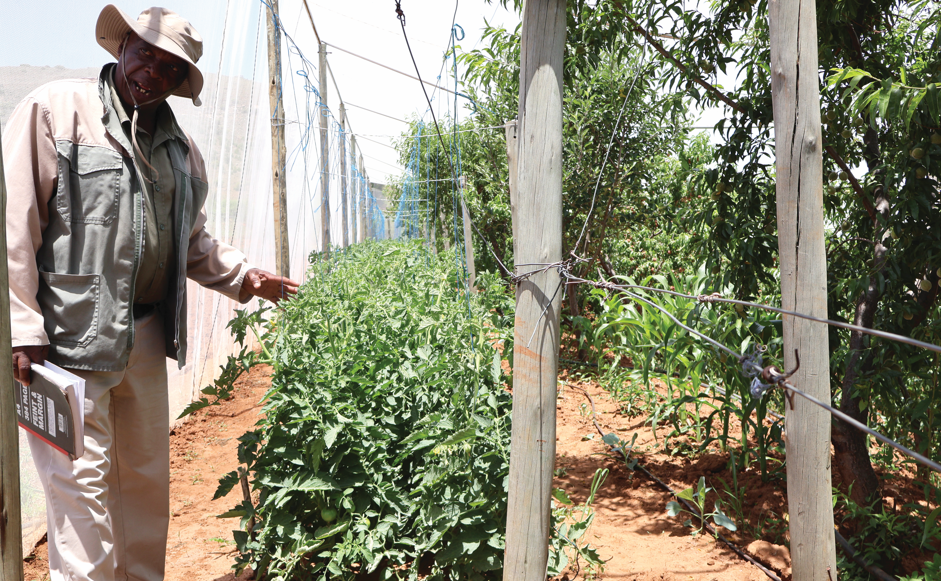By Seahlolo Reporters
Machache Farm is a growing agricultural enterprise that started on the back of retrenchment. Owned by Makhaola Sibolane, the farm is an epitome of mixed farm practice excellence.
With the boost of the Smallholder Agriculture Development Project (SADP II) grant, Machache Farm is a place of thriving orchards, vegetable plots and community employment for people of Ha-Ntho village in the Quthing district.
In the heart of Ha-Ntho village in Quthing district lies Machabeng Farm, a growing agricultural enterprise run by Makhaola Keneth Sibolane. Today, it is a place of thriving orchards, vegetable plots, and community employment. But behind this success story is a journey of retrenchment, resilience, and the transformative power of the Smallholder Agriculture Development Project (SADP).
Sibolane explains that the farm is more than just land, but a second chance at life after losing everything when retrenched.
“I was among thousands of Basotho men who were retrenched from the South African mines back in 2001. As sudden as it happened, it meant not only loss of income, but my entire livelihood,” he narrates.
The mines had been his livelihood for as long as he was an adult, but when the axe fell, he was forced to return home to Quthing with uncertain prospects.
He recalls taking into heart side programs by the mine, including the Social Plan, which charted his future into the agriculture powerhouse of Quthing mixed farming.
“The mining company I worked for had a training called the Social Plan, compulsory for all employees. They described it as a project that was preparing us for life after pension or even retrenchment when we return home,” he says, noting that when faced with the end of the road, the program suddenly made sense.
“While the project had different programs, for me, agriculture seemed the most practical choice,” he recounts.
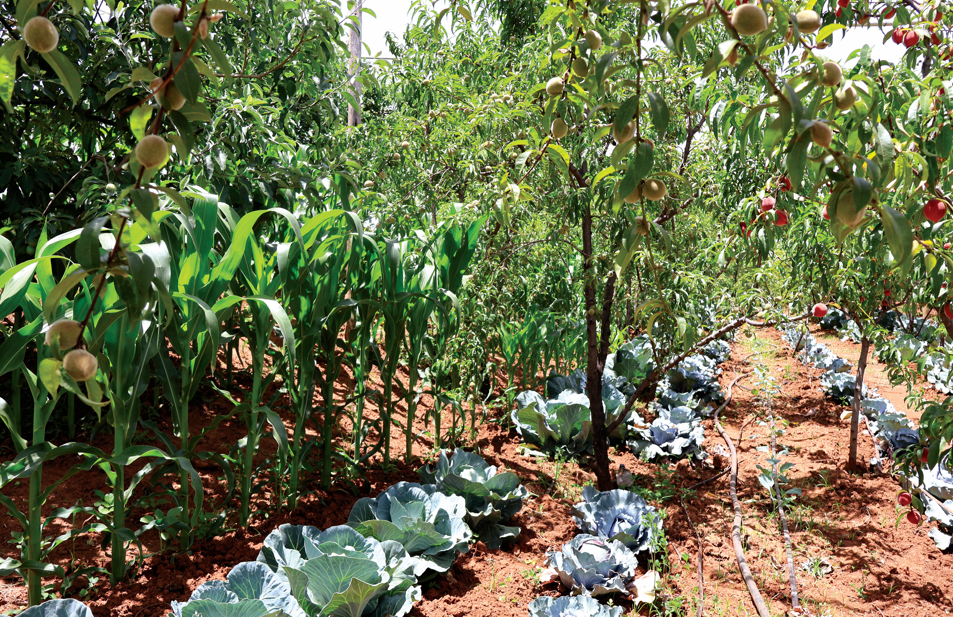
Filled with wretchedness, yet determined to try his hand at farming, Sibolane recalls taking a stop to buy 24 peach trees on his way home from Welkom, South Africa, where he worked.
“I really can’t recall what drew me to fruit trees when there are many agricultural codes, but I broke the land with a vision for an orchard,” he says.
“When I arrived home, agriculture felt insufficient, so I also tried to run a tavern and a mini-supermarket as other sources of income to support my family,” he says, but neither business felt right.
“It was only when December came and the peaches ripened that I realised farming was what I wanted to do,” he says.
For two years, he says, he sold peaches without major setbacks as just an informal farmer, but as his work gained recognition, he registered Machache Farm.
With growth, so did the challenges.
Battling Setbacks and Frustration
In the third year of production, Machache Farm faced problems never anticipated: theft. Patrons from Sibolane’s tavern would sneak into the orchard at night to steal fruit. By the end of the season, profits had disappeared.
“The theft became unbearable,” he explains.
He adds that the effects of climate change gripped in with extreme weather conditions, destroying his produce.
“On top of the weather, birds destroyed whatever little I could salvage. Out of frustration, I cut down some of the trees while I tried to figure out a better way to protect my farm. I had the orchard in an open field.”
Despite the setbacks, Sibolane’s determination never wavered.
In 2017, guided by the Ministry of Agriculture, he visited a nursery farm and discovered new peach cultivars that ripened at different times of the year.
This offered him a strategic advantage: spreading his harvest across seasons.
He bought 100 new peach trees, then added another 100 alongside grapevines and apple trees. By 2017, his orchard had more than 200 fruit trees.
But with growth came new challenges—irrigation was becoming unmanageable.
“I was drawing water from the Qomoqomo River using buckets. It meant paying labourers to fetch water daily, and the costs ate into my profits. Worse, the river water wasn’t always enough for my expanding orchard,” he says.
Eventually, the farm grew with an investment of a half-truck, water tanks, and a pump, but the financial strain was enormous. Bird attacks continued, particularly on his early-ripening peach trees in November.
By 2018, it seemed like every step forward came with two steps back. That was when an acquaintance told him about the SADP grants.
The SADP Breakthrough
“I applied for the SADP grant the first time and failed. I, however, used their comments to get my company in order. With the second grant, waiting anxiously, I still didn’t get it. I was devastated because by then I had invested so much of my own money both in improving the farm and also in the applications.”
With tenacity and desperation, Machache Farm was entered into the competitive grant the third time, this time under the SADP II.
“SADP officials visited Machabeng Farm. They asked probing questions about sustainability. They wanted to know how I would pay employees during fruitless seasons. They suggested I diversify into vegetables, which was eye-opening for me,” he recalls.
He adds, “That evaluation became a turning point for Machabeng Farm because SADP II recognised the potential of the orchard as a profitable business. I got the grant, and that changed the course of Machabeng Farm forever.”
Through the grant, the farm received a borehole water system, which ended reliance on expensive river water, a shade net, which protected fruit trees from hailstorms and bird damage, as well as training workshops, equipping him with modern orchard and mixed farming techniques.
“The borehole alone was a game-changer. For the first time, irrigation was reliable and affordable. The shade net meant I could finally protect my harvest and expand my production. SADP II turned my frustration into possibilities.”
Diversification and Growth
Acting on SADP II’s advice, Machabeng Farm diversified into vegetables, and soon the farm started producing cabbage, tomatoes, and other crops alongside fruit trees. This not only spread risk but also created a year-round income stream.
“In September 2023 alone, we sold 873 cabbages, earning M15,895. That same month, we sold peach seedlings worth nearly M1,000. The beauty of vegetables is that they sustain us even when fruit production is low,” Sibolane explains.
Tomatoes became another profitable venture, he says, revealing that from November to February, Machabeng Farm made M47,850 from tomato sales and M24,000 from cabbage.
“This was something I never imagined when I was only relying on peaches. Now, the farm feeds both my family and the community,” he reflects.
Creating Jobs and Livelihoods
With growing profits, Machabeng Farm expanded its workforce. From relying only on temporary labourers during harvest, the farm now employs four permanent workers, with seasonal workers also engaged during peak periods.
“Employment is one of the things I am most proud of. It means families in my community also benefit from this farm. It is not just about me anymore,” says Sibolane.
Machabeng Farm is now divided into three major sections: Orchards for peaches, apples, grapes, and apricots, Vegetables under shade nets for year-round production and Open-field grains for additional diversification.
Each section contributes to steady cash flow and resilience against shocks like climate change.
Challenges Remain
Despite the progress, farming is never without hurdles. Water shortages still affect operations during drought seasons when boreholes run low, while unpredictable markets sometimes reduce profits.
“With the advice of diversification, I took a leap and once planted red cabbage, only to realise that my local market in Quthing doesn’t prefer it. I had to learn the hard way that market research is just as important as production,” he shares.
Still, Sibolane embraces challenges as lessons. He regularly visits other farms and attends agricultural workshops to sharpen his knowledge. “Reading and learning from other farmers keeps me ahead,” he says.
From Local Farm to National Recognition
Sibolane’s success has not gone unnoticed. The World Bank, during its agricultural visits, identified Machabeng Farm as a model for sustainable smallholder farming. Experts advised him to optimise his soil further for vegetable production, a recommendation he has already acted on.
Today, Machabeng Farm stands as a playbook manual of possibility for retrenched workers and aspiring farmers.
What began with 24 peach trees is now a diversified enterprise feeding households, employing workers and supplying fresh produce to markets in Lesotho.
“I am acquiring more land so that Machabeng Farm expands. I have already planted an additional 70 trees, including 50 apple trees, while scaling up on vegetable production. With the SADP II assistance, I am growing the farm into a reliable supplier of fruits and vegetables throughout the year. If I can get to a place where I feed Quthing and inspire more like-minded farmers, I will have achieved ultimate success,” he beams.
“Farming is not easy; it requires resilience, risk-taking, and constant learning. But with the right support, it can transform lives. For me, SADP II was that support. It didn’t just give me equipment; it gave me a new vision for my farm,” he says.
Sponsored by


